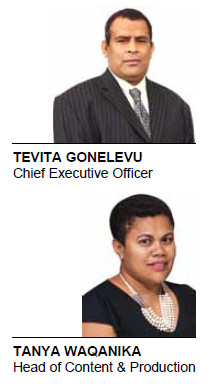BREAKING NEWS: Fiji TV CEO Tevita Gonelevu and Fiji TV
head of content Tanya Waqanika have been sacked
Now Hari Punja joins the fray, as Fiji TV’s second largest shareholder and the country’s best-known businessman makes direct protest to Bumbling Frank about Television Cross-Carriage Fiasco
Fijileaks has been told by reliable sources that the country’s best-known businessman Hari Punja has made a furious representation to Bainimarama about the anti-business conduct of Aiyaz Sayed-Khaiyum.
This, after learning that Fiji TV – owned 26 percent by his corporate holding Hari Punja and Sons Ltd– has been forced by Aiyaz to accept a completely lop-sided deal in which Fiji TV pay 90 percent, and FBC TV only 10 percent, of the TV rights fee due for the IRB/World Rugby Ltd 7s contract even though the coverage is being shared equally between Fiji TV and the government’s FBC TV.
FBC is headed by the Aiyaz's brother Riyaz who was parachuted into the post to the astonishment of the FBC board, and promptly built up more than $22m dollars of borrowings with the Fiji Development Bank, in the creation of FBC TV. Repayments on principal and interest are estimated to be hemorrhaging FBC’s balance sheet at the rate of up to $300,000 per month.
Fiji TV’s original proposal was to split the rights fee on a 50:43:7 basis in line with Aiyaz's much proclaimed analysis - produced by Carus, Qorvis’ in-house research company – that rights fee and sponsorships would be split according to a 50:43:7 split reflecting the share of FBC TV, Fiji TV and Mai TV respectively.
Given that Mai TV (and their 7 percent of share) were excluded from the last-minute, face-saving deal cobbled together by an embarrassed and out-of-his depth Aiyaz, Fiji TV’s second proposal in writing was a 50:50 split – with Fiji TV’s absorbing Mai TV’s share.
This was rejected by the Aiyaz himself, who intervened himself to set the proportions at 90:10.
The value of the TV rights deal is understood to be USD129,000 per season (or $245,000), meaning Fiji TV will pay US116,000 ($220,400) and FBC TV an insignificant USD13,000 ($24,600). It is a fair assumption that a similar split will be demanded by Aiyaz for the 2015 Rugby World Cup which is also to be shared between the two stations.
Punja’s fury underscores a galloping sense of alarm within the business community that the government is willing to sacrifice the basic tenets of commerce on the altar of political expediency and score-settling at which the erratic and vengeful Aiyaz is a master.
Mai TV’s tiny, advertising-led budget has been used cautiously and wisely by its shareholders and yet has produced some memorable locally-produced programmes and home-grown talent. Mai TV came to purchase the FIFA World Cup 2014 after winning the trust of the FIFA rights holders with a long build-up of more marginal programming, including youth, indoor and women’s football, over several years.
By contrast FBC TV’s existence has been entirely taxpayer or FDB-funded, completely distorting the media market, to the disadvantage of Mai TV who were forced to give up the 2014 FIFA World Cup, the first event captured by the Television (Cross-Carriage of Designated Events) Decree 2014, with one stroke of Aiyaz's pen.
(‘That worked out beautifully,’ as Aiyaz told Parliament on December 9 – without a trace of shame or irony – of the FIFA World Cup 2014 being hijacked by the Cross-Carriage Decree.)
Although Punja is no longer a director of Fiji TV – he resigned in 2011 to comply with the 2010 Media Decree which allowed for an individual to have only one directorship per media company – he had been up to that point the station’s longest serving director, starting in 1996. He remains a shareholder and director of Communications Fiji Ltd.
Far from being a passive player in Fiji TV’s affairs (or noted anti-government figure), in 2012 Hari Punja and Sons Ltd helped the government by buying out their 14 percent in Fiji TV, 1.442m shares at $2.40 a share, according to a published statement.
Fiji TV have signed off on the embarrassing deal, presumably as part of trying to roll over their six-month license which is in the sole gift of Aiyaz to extend or cancel. The licence runs out on December 31.
Suva accountant Iowane Naiveli – chairman of Fijian Holdings, the 61 percent majority owner of Fiji TV – formally signed off on Aiyaz's risible deal but negotiations will no doubt have been handled by the Sri Lankan Nouzab Fareed who is FHL’s chief executive. Fareed is part of an increasingly visible Sri Lankan cabal of pro-regime supporters that also takes in senior management figures in Vodafone, ATH and CJ Patel, as well as key judicial figures.
In this squalid and tawdry affair, as Fiji under Frank slips closer and closer to the kleptocracy of Mugabe’s Zimbabwe - at least Hari Punja is fighting the good fight on behalf of shareholders everywhere. Who in Fijian Holdings (whose stated corporate purpose remains: "To accelerate the participation of indigenous Fijians in the commercial sector and in doing so, enhance their socio-economic standing") is looking after the interest of their indigenous shareholders?
Given that shareholding in the main Fijian Holdings listed company remains only open to indigenous Fijians (interested new shareholders still have to present their I Vola ni kawa bula extract along with the share-purchase order), how long before indigenous Fijians will wake up to the reality of what is being done to ‘their’ company, ‘their’ TV station, using ‘their’ national team/sport?


